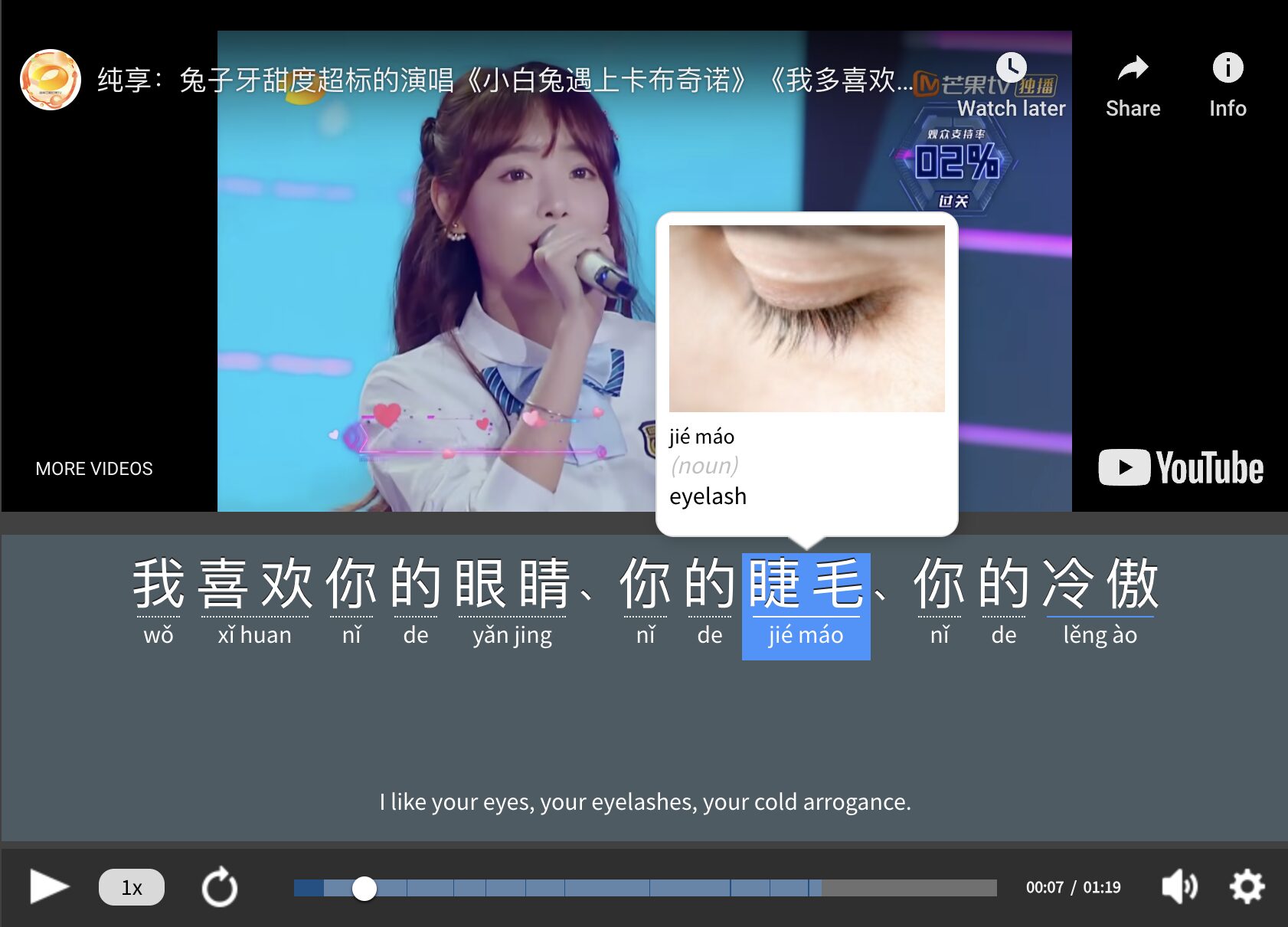Contents
- 1. 谢谢 (xiè xiè) — Thank you
- 2. 感谢 (gǎn xiè) — Many thanks
- 3. 哪里哪里 (nǎ li nǎ li) — You’re flattering me
- 4. 麻烦你了 (má fan nǐ le) — Sorry for the trouble
- 5. 不不 (bù bù) — No, no
- 6. 你太好啦 (nǐ tài hǎo la) — You’re the best
- 7. 谢谢大家… (xiè xiè dà jiā…) — Thank you all…
- 8. 谢谢你的 (xiè xiè nǐ de) + Noun — Thank you for…
- 9. 谢谢你 (xiè xiè nǐ) + Verb — Thank you for…
- Gestures to Show Appreciation and Say Thank You in Chinese
- How to Receive a Gift and Say Thank You in Chinese
- How to Respond to “Thank You” in Chinese
- And one more thing...
9 Ways to Say Thank You in Chinese (Plus Culture Tips)

If you’re learning Chinese, you might discover the many ways native Mandarin speakers can express gratitude beyond bowing or the basic 谢谢 (xiè xiè) — “Thank you.”
In this guide, I’ll show you nine useful words and phrases to say “thank you” in Chinese plus give you several cultural lessons at the end.
Download: This blog post is available as a convenient and portable PDF that you can take anywhere. Click here to get a copy. (Download)
1. 谢谢 (xiè xiè) — Thank you
When in doubt, use 谢谢. This is the default, basic way of saying “thank you” in passing, when you’re accepting gifts or every other casual encounter in between.
A variation of this barebones phrase includes 多谢 (duō xiè) — “Thanks a lot” which is used in SMS messages and notes as opposed to writing or typing 谢谢.
It’s appropriate for casual spoken conversations as well, like when you’re handed something at work.
2. 感谢 (gǎn xiè) — Many thanks
感谢 or 非常感谢你 (fēi cháng gǎn xiè nǐ) — “Thank you very much” can be used for extreme situations where you owe someone serious gratitude.
This variation is appropriate for many semi-formal interactions.
For example, if a classmate helps you out with a big part of a school project or a coworker covers you at work unexpectedly, then 感谢 or 非常感谢你 are appropriate phrases to use.
3. 哪里哪里 (nǎ li nǎ li) — You’re flattering me
This is a rather cute expression similar to saying “Oh, stop!” flirtatiously in English. 哪里哪里 can be used for different non-romantic kinds of situations as well.
This phrase roughly translates to “you flatter me” or “you’re too kind” and is used when receiving a compliment.
Whether you’ve received a flirtatious compliment from someone you’re crushing on or you’re being praised by your boss for your hard work recently, 哪里哪里 is an apt response.
4. 麻烦你了 (má fan nǐ le) — Sorry for the trouble
麻烦你了 literally translates to “inconvenience to you.” This phrase sounds very self-deprecating in English, so “sorry for the trouble” is a more practical translation.
It’s a great phrase to use when someone else has gone out of their way to help or work for you. Note that it isn’t quite a formal apology.
Even if someone has done a favor for you that you didn’t ask for or if the work they’ve done for you wasn’t terribly inconvenient for them, 麻烦你了 is an appropriate way of saying “thank you” with a bit more gusto.
This phrase is common in office or business culture.
5. 不不 (bù bù) — No, no
Deflecting compliments is common in Mandarin Chinese, no matter your gender or the compliment that was given. It isn’t a self-deprecating practice, either.
Actively behaving humbly is important in many Chinese-speaking cultures and makes one look very likable. If a young Westerner receives a compliment, they typically respond with “aw, thanks.” Not in Chinese culture!
Simply waving your hands and saying “no way” is a good way to deflect a compliment and come off as humble, modest and admirable. We both know you deserved that compliment, but deflecting it just makes you look better.
6. 你太好啦 (nǐ tài hǎo la) — You’re the best
你太好啦 is a great expression to use between family, friends or people you know really well in a work or school environment.
This phrase properly expresses thankfulness while lifting up someone you care about at the same time. Of course, you can expect a feverish response somewhere along the lines of 不不.
Even if your Mandarin-speaking friend deflects the gesture entirely, rest assured that you expressed your thankfulness in a way that made them feel pretty great about themselves.
你太好啦 probably shouldn’t be used in a formal situation with someone you don’t know super well or your boss. Keep it between you and your buds.
7. 谢谢大家… (xiè xiè dà jiā…) — Thank you all…
When addressing a group at a formal banquet for a toast, a business meeting, a wedding or some other large group setting that’s formal in nature, 谢谢大家… should be used as the first part of the phrase.
The second part of this phrase should be specific. You could add:
…的关注。 (…de guān zhù.) — …for paying attention.
…的来临。 (…de lái lín.) — …for coming here.
For example:
谢谢大家的关注。 (xiè xiè dà jiā de guān zhù.) — Thank you all for paying attention.
谢谢大家的来临。 (xiè xiè dà jiā de lái lín.) — Thank you all for coming here.
It’s important to make the differentiation between thanking one person and a large group. It’s also important to state what you’re thanking the large group for in a formal situation. Not too complicated, right?
8. 谢谢你的 (xiè xiè nǐ de) + Noun — Thank you for…
Let’s build off those last few examples we just saw. When you want to thank someone for something specific—like an object—you can use 谢谢你的 + noun. For example:
谢谢你的关心。 (xiè xiè nǐ de guān xīn.) — Thank you for your concern.
谢谢你的礼物。 (xiè xiè nǐ de lǐ wù.) – Thank you for your gift.
9. 谢谢你 (xiè xiè nǐ) + Verb — Thank you for…
Use this phrase if you want to thank someone for something they did. For example:
谢谢你提醒我。 (xiè xiè nǐ tí xǐng wǒ.) – Thank you for reminding me.
谢谢你帮我。 (xiè xiè nǐ bāng wǒ.) – Thank you for helping me.
Gestures to Show Appreciation and Say Thank You in Chinese
Chinese culture is very heavy on gestures and non-verbal ways of expressing things, especially gratitude. Here are a few ways to say “thank you” without actually saying it.
- Bow slightly. One of the most common ways to show appreciation and respect, you’re likely already familiar with this one. Slightly bowing your head or upper body is a traditional way to say “thank you.” The deeper you bow, the more respect you show. So depending on who you’re thanking, the situation might call for just a slight bow of the head.
- Nod and smile. If the situation is very casual and informal—such as thanking a very close friend for something small—a simple smile, nod and 谢谢 will do.
- Hand over heart. Placing your right hand over your heart while saying thank you adds an extra bit of sincerity to your appreciation.
- Two-handed handshake. When thanking someone for a gift or favor, it’s common to shake the giver’s hand while saying thank you. But do this with both hands, not just one.
- Send a gift. It’s also common to show appreciation through gift giving in Chinese culture, through things like tea, fruit or wine.
- “Thank you” notes. Writing “thank you” notes is still popular in China, so this simple act of appreciation can go a long way.
- Treat someone to a meal. Finally, you can offer to invite someone to a meal. Just remember that this means you’re the one paying.
When it comes to learning other cultures—especially cultures that are very different from yours—the best way to learn quickly is through immersion. But going to China and figuring it out for yourself is unrealistic for most people, not to mention intimidating.
I recommend you start online. Rather than just reading guides—which is an incredible way to start—supplement your learning by watching. For example, you can use an online program like FluentU to watch real Chinese videos that native speakers watch to not only learn the language but also see the culture in action.
FluentU takes authentic videos—like music videos, movie trailers, news and inspiring talks—and turns them into personalized language learning lessons.
You can try FluentU for free for 2 weeks. Check out the website or download the iOS app or Android app.
P.S. Click here to take advantage of our current sale! (Expires at the end of this month.)
How to Receive a Gift and Say Thank You in Chinese
- Receive the gift with both hands. Just like you shake someone’s hand with both hands when expressing gratitude, you never receive a gift with just one. Extend both your hands and take the gift with both.
- Express modesty and humility. This isn’t a necessity, but if you really want to blend in with Chinese culture, it’s common to use phrases like 太客气了 (tài kè qi le — you’re too kind) or 不用了 (bú yòng le — it wasn’t necessary) when receiving a gift to show humility.
- Don’t open the gift immediately. You typically don’t want to open the gift in front of the person who gave it to you, unlike in Western cultures where this might be considered rude. It’s more customary to open the gift later in private and then call or write to the person to thank them.
- Give a gift back—but later. This is especially common with very thoughtful and generous gifts. You can give a gift back, but wait until a slightly later date. But be careful to avoid certain gifts that have superstitious or negative connotations, including clocks or watches, shoes, scented candles, sharp objects and anything of the number four.
How to Respond to “Thank You” in Chinese
So now you know how to thank someone in Chinese culture—verbally and non-verbally. But what do you do if you’re the one being thanked? Here are a few quick ways to say “you’re welcome”:
| Chinese | Pinyin | English |
|---|---|---|
| 不客气 | bú kè qì | You're welcome |
| 不用谢 | bú yòng xiè | No need to thank me / No need for thanks |
| 没事 | méi shì | It's nothing / No big deal |
| 别客气 | bié kè qì | Don't mention it |
| 客气什么呢 | kè qi shén me ne | Why so polite? |
We have a full guide on how to say you’re welcome in Chinese here if you want to go into more depth:
You’re Welcome in Chinese: 17 Gracious Phrases That Natives Actually Use | FluentU Chinese Blog
“You’re welcome” in Chinese is often expressed with 不客气 (bú kè qì) or 别客气 (bié kè qì), but did you know that there are actually several more ways…
Isn’t Chinese such a diverse and fascinating language? With this newfound knowledge of how to properly say thank you in Chinese, you’re taking one more step towards mastering this language and making meaningful connections with Chinese people.
Download: This blog post is available as a convenient and portable PDF that you can take anywhere. Click here to get a copy. (Download)
And one more thing...
If you like learning Chinese at your own pace and from the comfort of your device, I have to tell you about FluentU.
FluentU makes it easier (and more fun) to learn Chinese by making real content like movies and series accessible to learners. You can check out FluentU's curated video library, or bring our learning tools directly to Netflix or YouTube with the FluentU Chrome extension.
One of the features I find most helpful is the interactive captions—you can tap on any word to see its meaning, an image, pronunciation, and other examples from different contexts. It’s a great way to pick up vocab without having to pause and look things up separately.
FluentU also helps reinforce what you’ve learned with personalized quizzes. You can swipe through extra examples and complete engaging exercises that adapt to your progress. You'll get extra practice with the words you find more challenging and even be reminded you when it’s time to review!
You can use FluentU on your computer, tablet, or phone with our app for Apple or Android devices. Click here to take advantage of our current sale! (Expires at the end of this month.)











